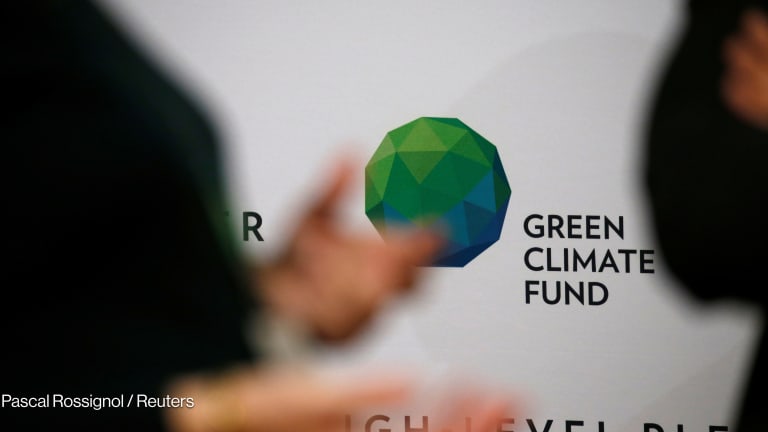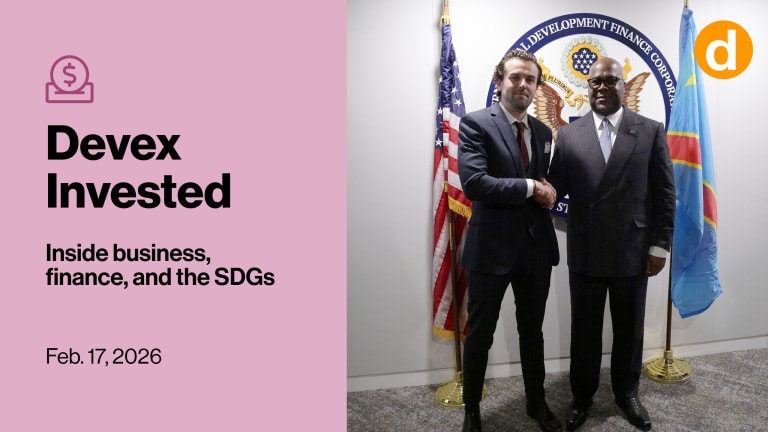2021 a record year for BII ahead of transition to new name, strategy

British International Investment, the United Kingdom’s development finance institution, reported record commitments last year as it got ready to take on its new name and strategy in 2022, according to an annual report it released Tuesday.
BII, which until April was known as CDC Group, made nearly £1.9 billion in new commitments in 2021, up 50% from the previous year. It’s an indication that BII should be on track to meet its future annual goals of committing between £1.5 billion and £2 billion ($1.8 billion and $2.4 billion) per year under its new 2022-26 technical strategy — a plan that will guide its investments, including an expansion of its geographical focus, an increase in climate finance, and an emphasis on partnering with U.K. companies.
Hear Nick O’Donohoe at Devex World
Devex World, our flagship event set for July 12, will include discussions with BII CEO Nick O’Donohoe and other luminaries in the sector, such as IFC chief Makhtar Diop. Devex Pro members can get a free ticket to join the enhanced virtual experience from anywhere in the world.
BII CEO Nick O’Donohoe called 2021 the “busiest year yet” based on not just that top-line number but also a number of other metrics. BII committed £479 million in climate finance — the most in a single year since the institution began tracking that number. It also increased its mobilization of private capital to a record amount of nearly £1.5 billion in 2021, O’Donohoe said during an event Tuesday.
About 28% of total investments last year qualified as gender-smart investments under the 2X Challenge for supporting women and women-owned businesses. The figure already exceeds BII’s target for 25% of all its investments to meet 2X Challenge criteria in the 2022-26 strategy.
2021 wasn’t “an easy year from an economic or political perspective,” which is also true for the first half of 2022, amid ongoing impacts from the COVID-19 pandemic, mounting climate challenges, and the effects of the war in Ukraine, O’Donohoe said.
“All of these things are only mitigated by strong private sector growth. That’s going to need capital in countries with very small capital markets and inflows,” O’Donohoe said, adding that BII’s job is to “bring the long-term and reliable finance and support that’s needed during these difficult times.”
BII is committed to working in countries that have the greatest needs, he said, adding that 60% of last year’s disbursements went to fragile states — the highest rate in five years.
Sign up for Devex Invested
The must-read weekly newsletter that keeps you up to date with news about business, finance, and the SDGs.
In 2021, 72% or about £1.3 billion worth of BII’s investments were in Africa, with 27% or £510.2 million worth in Asia. Those figures are set to change in 2022 as the new strategy expands the institution’s geographic footprint to include the Indo-Pacific and the Caribbean. Some development experts have raised concerns about this expansion, saying it could dilute the agency's focus on the lowest-income people and nations, so these numbers may be an important benchmark moving forward.
The institution now has a portfolio of £6 billion. BII had a 6.8% return on net assets in 2021 — a turnaround from the losses of the previous year, keeping it on track for its overall target of an average of 3.5% in returns.
Development experts routinely voice concerns about whether development finance institutions such as BII are taking on enough risk or if they are too focused on financial returns.
In its annual report, BII seemed to anticipate such a critique.
“Although this year’s financial results are positive, it remains the case that the highly developmental strategy adopted since 2012 – which meant a narrower geographic mandate and led us to seek out higher risk – is likely to lead to lower returns and increased volatility. We are also aware that the markets where we invest are showing signs of decline since the year-end,” the report says.

Search for articles
Most Read
- 1
- 2
- 3
- 4
- 5








